
Ben Adler
@benadler.bsky.social
Postdoc @ Doudna Lab - UC-Berkeley | Bacteriophage engineering | CRISPR | Biotechnology | Microbiology | All Combinations Thereof | He/him. Opinions my own.
Thank you to everyone who helped make this story happen!
Obligatory meme to summarize:
“How I imagine phage facing CBASS and mCpol”
Obligatory meme to summarize:
“How I imagine phage facing CBASS and mCpol”
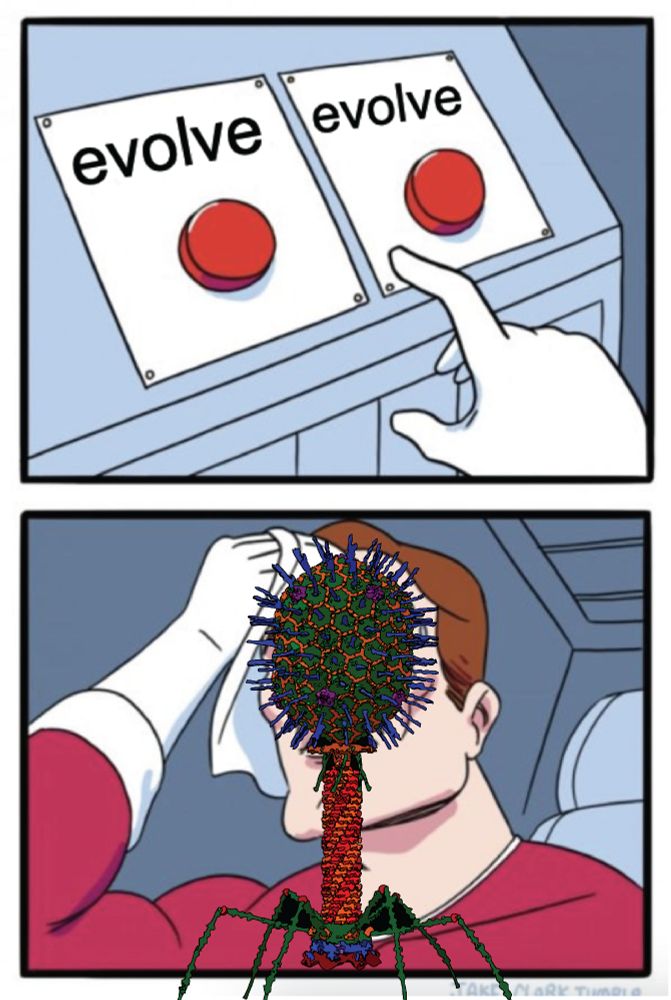
October 1, 2025 at 5:57 PM
Thank you to everyone who helped make this story happen!
Obligatory meme to summarize:
“How I imagine phage facing CBASS and mCpol”
Obligatory meme to summarize:
“How I imagine phage facing CBASS and mCpol”
By facilitating an **inhibitory** immune signaling pathway using 2’3-cdiAMP, bacterial viruses face an evolutionary choice: inhibit signaling immune systems or disrupt mCpol’s “healthy” signaling.
This has major consequences in the genetic tools phages can use to subvert immune systems!
This has major consequences in the genetic tools phages can use to subvert immune systems!
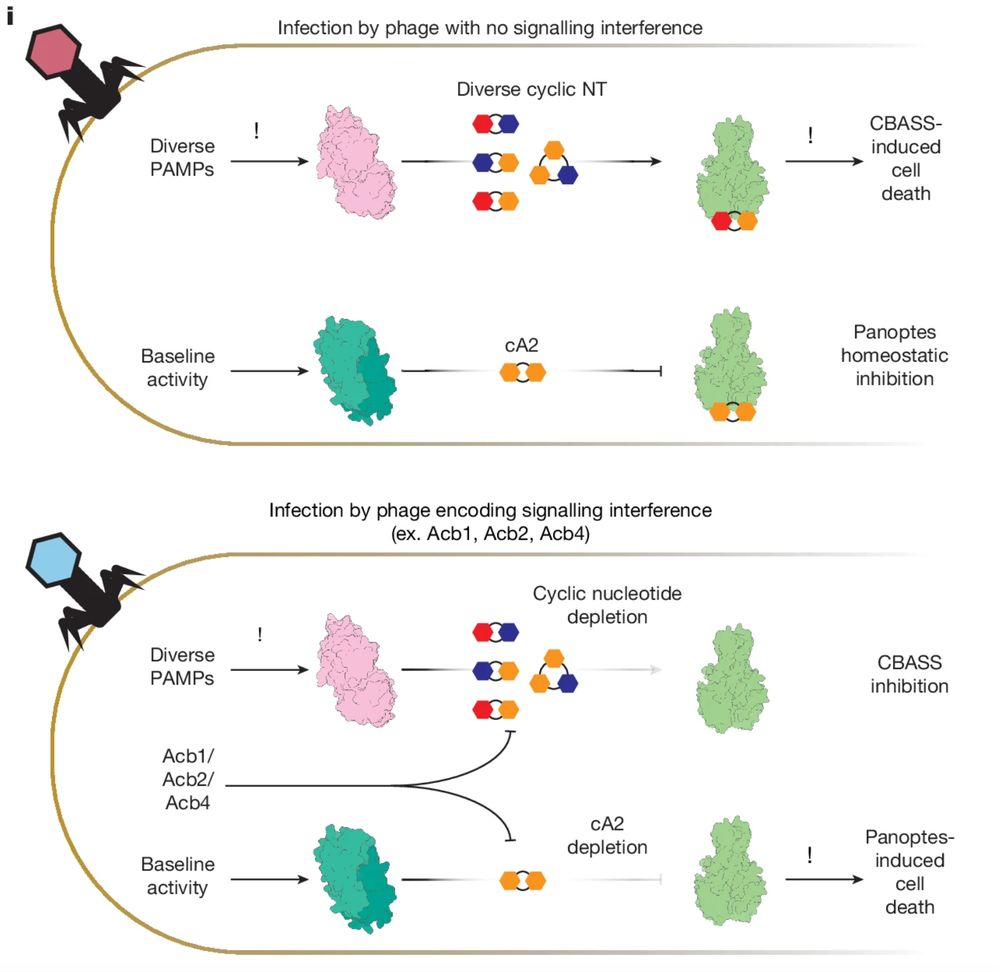
October 1, 2025 at 5:57 PM
By facilitating an **inhibitory** immune signaling pathway using 2’3-cdiAMP, bacterial viruses face an evolutionary choice: inhibit signaling immune systems or disrupt mCpol’s “healthy” signaling.
This has major consequences in the genetic tools phages can use to subvert immune systems!
This has major consequences in the genetic tools phages can use to subvert immune systems!
Alongside this work our collaborators down at UCSD have been using CRISPRi-ART to uncover the secrets of Chimalliviruses and the phage nucleus:
ChmA (including Cryo-ET post-CRISPRi-ART below): doi.org/10.1101/2023...
ChmC: doi.org/10.1093/nar/...
PicA: doi.org/10.1073/pnas...
ChmA (including Cryo-ET post-CRISPRi-ART below): doi.org/10.1101/2023...
ChmC: doi.org/10.1093/nar/...
PicA: doi.org/10.1073/pnas...
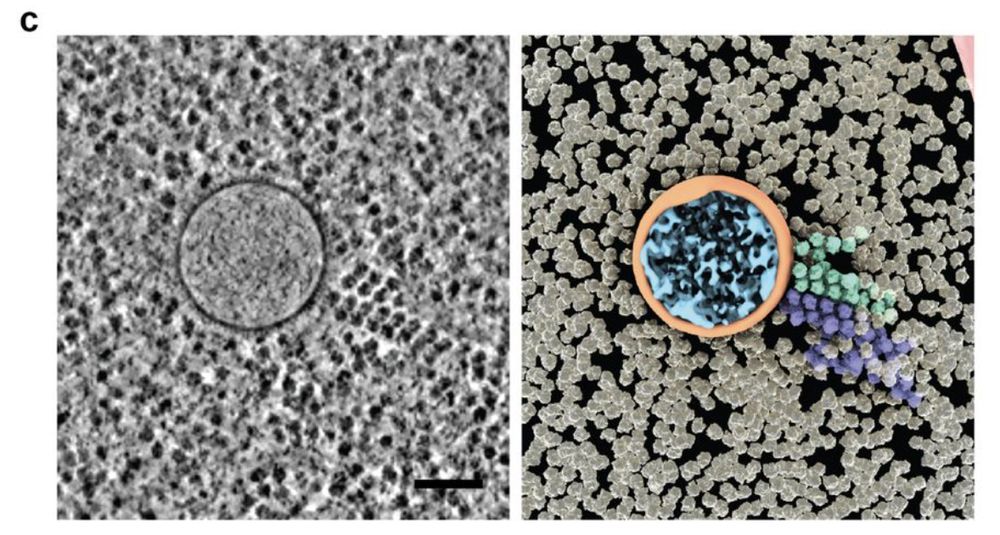
February 26, 2025 at 7:42 PM
Alongside this work our collaborators down at UCSD have been using CRISPRi-ART to uncover the secrets of Chimalliviruses and the phage nucleus:
ChmA (including Cryo-ET post-CRISPRi-ART below): doi.org/10.1101/2023...
ChmC: doi.org/10.1093/nar/...
PicA: doi.org/10.1073/pnas...
ChmA (including Cryo-ET post-CRISPRi-ART below): doi.org/10.1101/2023...
ChmC: doi.org/10.1093/nar/...
PicA: doi.org/10.1073/pnas...
But we have phenotypes! This is where discovery begins. As mentioned earlier, this has a long history in phage biology, where simple biological discoveries become new biotechnological tools.

February 26, 2025 at 7:42 PM
But we have phenotypes! This is where discovery begins. As mentioned earlier, this has a long history in phage biology, where simple biological discoveries become new biotechnological tools.
This can also be done at genome-wide (or transcriptome-wide) scale, giving a birds-eye view of what is important for phage infection - often uncovering unexpectedly important genes with no known function... yet.

February 26, 2025 at 7:42 PM
This can also be done at genome-wide (or transcriptome-wide) scale, giving a birds-eye view of what is important for phage infection - often uncovering unexpectedly important genes with no known function... yet.
If you target an important (or "fit") gene, you can observe both mild and dramatic phenotypes by simply changing a crRNA sequence (ie ~30bp) and works across a large diversity of phages.
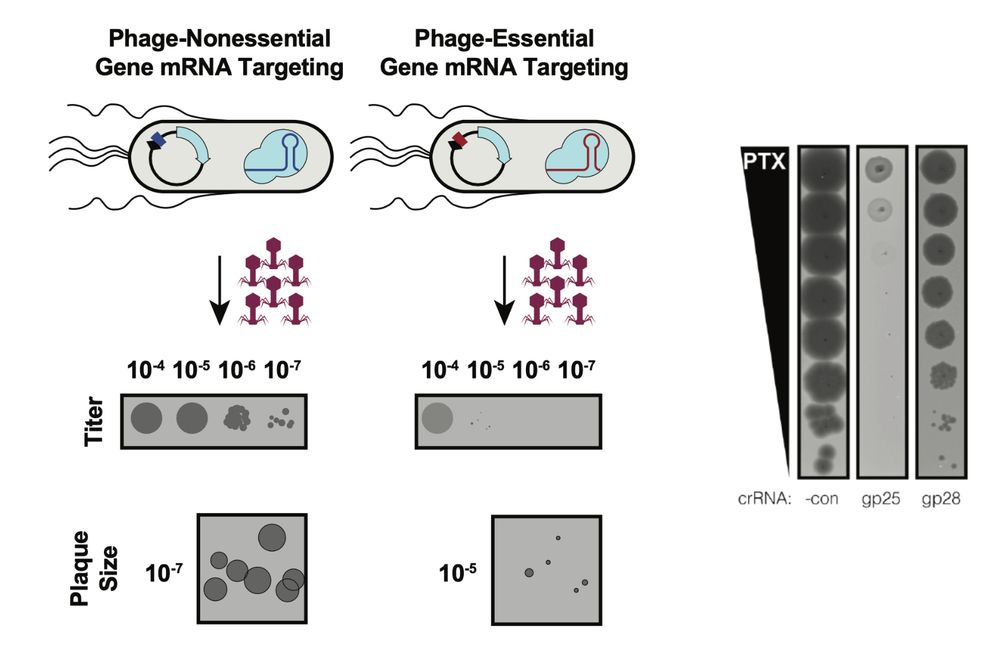
February 26, 2025 at 7:42 PM
If you target an important (or "fit") gene, you can observe both mild and dramatic phenotypes by simply changing a crRNA sequence (ie ~30bp) and works across a large diversity of phages.
This diversity between phages and their hosts is more than curiosity, *it is genetic innovation*. You can trace lots of #biotechnology (CRISPR, RM, phage display, protein expression) to a simple question: "is this gene important for phage infection and when?"
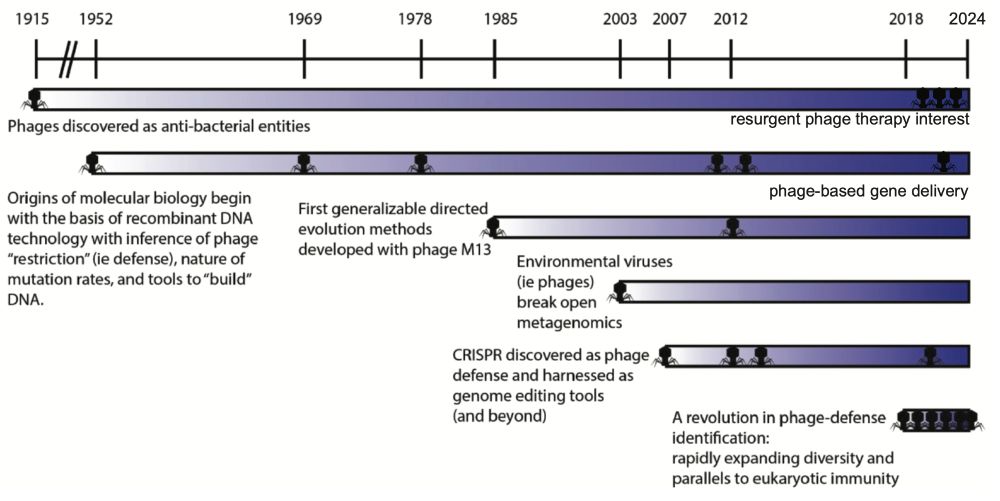
February 26, 2025 at 7:42 PM
This diversity between phages and their hosts is more than curiosity, *it is genetic innovation*. You can trace lots of #biotechnology (CRISPR, RM, phage display, protein expression) to a simple question: "is this gene important for phage infection and when?"
Bacteriophages (phage) are collectively the most abundant and diverse forms of life(?) on earth. They are predators of bacteria and are locked in a genetic “arms race” with their bacterial hosts. This has led to incredible molecular innovation... and genetic diversity.
#microsky #phagesky
#microsky #phagesky
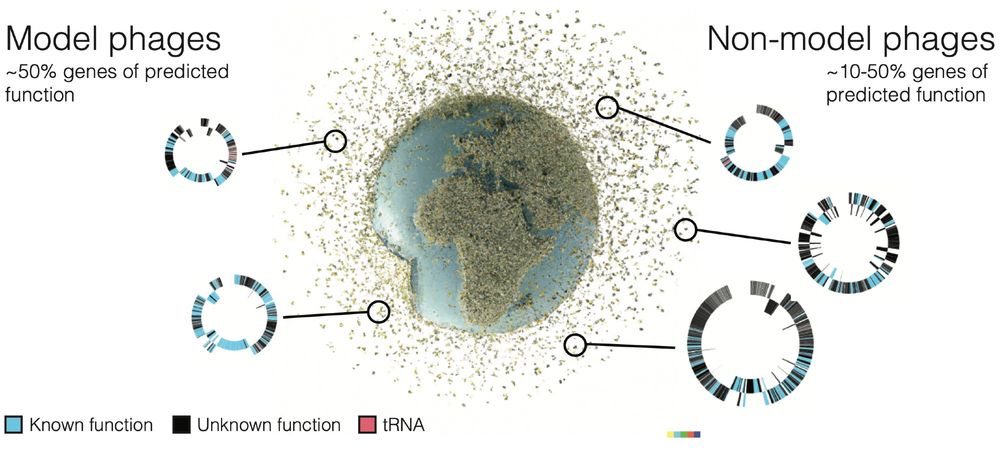
February 26, 2025 at 7:42 PM
CasPEDIA is live!
We collected tons of information on important CRISPR enzymes, put it all in one place and provide a framework to compare diverse enzymatic activities.
caspedia.org
academic.oup.com/nar/article/...
We collected tons of information on important CRISPR enzymes, put it all in one place and provide a framework to compare diverse enzymatic activities.
caspedia.org
academic.oup.com/nar/article/...

January 12, 2024 at 8:35 PM
CasPEDIA is live!
We collected tons of information on important CRISPR enzymes, put it all in one place and provide a framework to compare diverse enzymatic activities.
caspedia.org
academic.oup.com/nar/article/...
We collected tons of information on important CRISPR enzymes, put it all in one place and provide a framework to compare diverse enzymatic activities.
caspedia.org
academic.oup.com/nar/article/...
Beyond fitness screening, even individual crRNAs are incredibly useful for phage biology. For example, T5 protein A2 is necessary for full genome injection. A single crRNA can, presumably halt this process so we can study it.
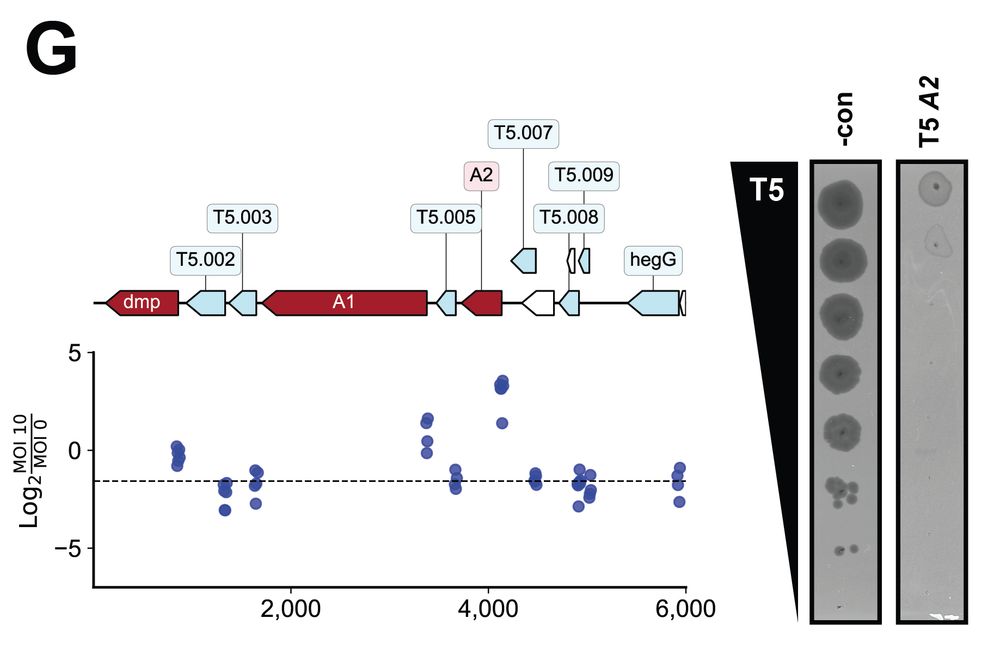
September 19, 2023 at 8:22 PM
Beyond fitness screening, even individual crRNAs are incredibly useful for phage biology. For example, T5 protein A2 is necessary for full genome injection. A single crRNA can, presumably halt this process so we can study it.
Unexpectedly, for non-T4 phages, we find a strong enrichment for genes of unknown function. These results suggest new mechanisms during infection and can serve as a guiding light for “what’s important”!

September 19, 2023 at 8:21 PM
Unexpectedly, for non-T4 phages, we find a strong enrichment for genes of unknown function. These results suggest new mechanisms during infection and can serve as a guiding light for “what’s important”!
We next employed CRISPRi-ART to probe fitness across the genomes of four (unrelated) lytic phages: T4, T5, SUSP1, and PTXU04 (a rare, singleton phage!).
For model phage T4, our measurements mirror essentiality. Outside of T4, these are the first systematic mappings of gene fitness in these phages!
For model phage T4, our measurements mirror essentiality. Outside of T4, these are the first systematic mappings of gene fitness in these phages!


September 19, 2023 at 8:21 PM
We next employed CRISPRi-ART to probe fitness across the genomes of four (unrelated) lytic phages: T4, T5, SUSP1, and PTXU04 (a rare, singleton phage!).
For model phage T4, our measurements mirror essentiality. Outside of T4, these are the first systematic mappings of gene fitness in these phages!
For model phage T4, our measurements mirror essentiality. Outside of T4, these are the first systematic mappings of gene fitness in these phages!
Furthermore, CRISPRi-ART works broadly across E.coli phage diversity (when targeting an essential gene). In other words, robust, protein expression knockdown in crafty, lytic phages is possible!

September 19, 2023 at 8:19 PM
Furthermore, CRISPRi-ART works broadly across E.coli phage diversity (when targeting an essential gene). In other words, robust, protein expression knockdown in crafty, lytic phages is possible!
Although phage genomes pose a wide variety of challenges to classical dsDNA targeting CRISPRi, CRISPRi-ART is capable of inhibiting phage essential genes in lytic phage T4

September 19, 2023 at 8:18 PM
Although phage genomes pose a wide variety of challenges to classical dsDNA targeting CRISPRi, CRISPRi-ART is capable of inhibiting phage essential genes in lytic phage T4
In E.coli, crRNA targeting RBS sequences could knock down expression of essential genes and lead to clear fitness effects. Furthermore, this CRISPRi-like strategy can be extended to genome-wide screening of essential screening of host genes.

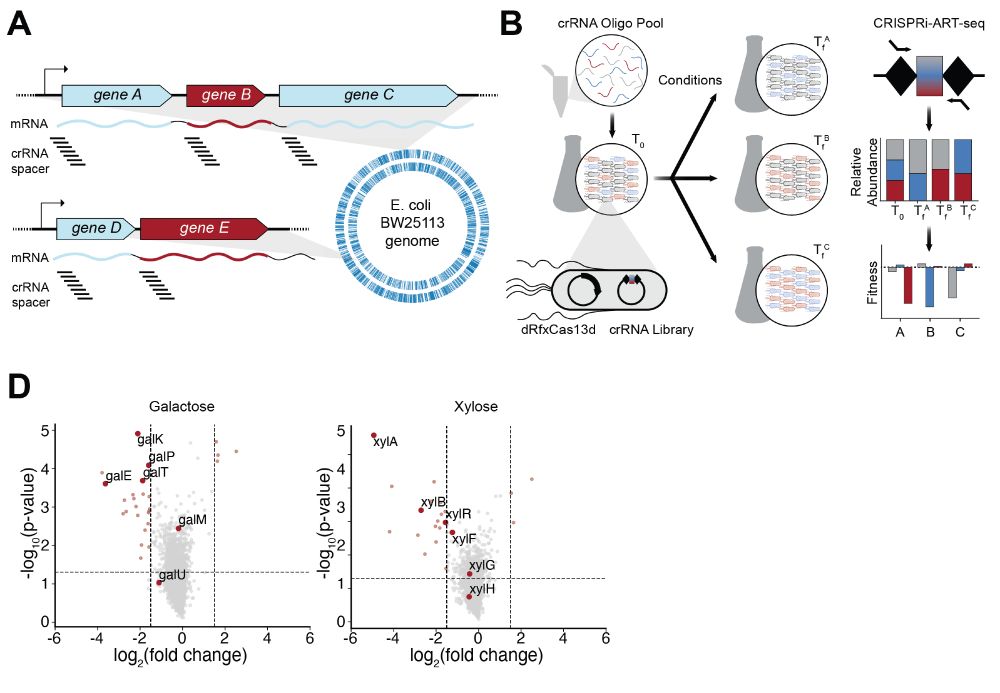
September 19, 2023 at 8:17 PM
In E.coli, crRNA targeting RBS sequences could knock down expression of essential genes and lead to clear fitness effects. Furthermore, this CRISPRi-like strategy can be extended to genome-wide screening of essential screening of host genes.


